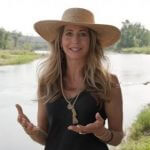Julia Blatt
Concord, Massachusetts
Julia Blatt has been protecting rivers since 1987, when, as a congressional aide, she helped gain federal Wild and Scenic River status for the Sudbury, Assabet, and Concord Rivers. She has worked as a planner for the state, and served as the Executive Director of the Organization for the Assabet River (now OARS) for eight years. During her tenure at OAR, she convinced Intel Massachusetts to establish a $1.5M recharge fund for the Assabet watershed. The group’s efforts also resulted in phosphorus limits for the river’s four wastewater treatment facilities that set a precedent in New England.
Since, 2009, Julia has served as the founding Executive Director of the Massachusetts Rivers Alliance. Mass Rivers works to improve river protection across the Commonwealth and to strengthen and connect its 72 member groups. Their current highest priorities are protecting stream flow, cleaning up stormwater, and increasing investment in greener water infrastructure, some of the thorniest challenges facing rivers in Massachusetts. The group’s recent successes include a multi-plaintiff lawsuit that led to the implementation of a statewide stormwater permit; a significant increase in state budgets for three state agencies that protect rivers; and twice defeating the Governor’s legislation to move water pollution control from the federal government to the state.
Julia has been recognized for her contributions to river protection in Massachusetts with awards from the National Park Service, Mass Audubon, the Ipswich River Watershed Association, the Charles River Watershed Association, and Trout Unlimited. She holds a bachelor’s degree in history from Brown and a master’s in Urban and Environmental policy from Tufts and currently serves on the board of River Network. She and her husband live in the Mystic River Watershed.
This interview was conducted by Carly Schmidt on August 28, 2018. Learn more about Julia’s work at the Massachusetts Rivers Alliance.
Did you grow up around water? What are your fondest early memories of water?
I didn’t grow up around rivers or streams, even though Massachusetts is a wet state. I grew up hiking in the woods and, from a young age, I loved nature and animals. However, it really wasn’t until I was older that I started to explore rivers. As a young adult, I did lots of canoeing, and this continued with my kids. Their childhoods were full of river trips and they would have a very different answer to this question!
Growing up in a suburban town, we had some wildlife—toads and blue jays here and there—but it wasn’t until I paddled the river in my hometown – as an adult – that I realized that my hometown has so much more wildlife that comes to a river, like awe-inspiring great blue herons, snapping turtles and painted turtles, red-winged blackbirds, beavers, and even river otters. How peaceful it is to be on a river and coexist with them.
When did you first realize that you wanted to stand up for rivers?
I fell into it when I was in my 20s. I was a congressional aide and my boss was on the Interior Appropriations Subcommittee, so he had a very powerful role with the ability to bring funding to our district for parks and other other environmental protection. I volunteered to take on environmental issues and started calling environmental groups in the district, asking if there was something we could do for them. Someone requested that we designate a Wild and Scenic River. This led me to the National Park Service, kicking off an 11-year process to make the designation. Working on that project introduced me to the world of environmental protection, and the wonderful people who make it their life’s work – my tribe!
Why is protecting rivers important to you now?
There are so many reasons to protect rivers; while it might at first seem altruistic to want to protect nature for wildlife, it almost always comes back to us – we need clean water, we need natural beauty, we need water recreation. Healthy rivers make life better for everyone. There is a lot of tension right now between the human tendency to exploit the environment and our simultaneous need for healthy ecosystems. This is particularly true of water because we consume it, we dam it, we discharge industrial waste and sewage into it, and we build buildings and pavements right up to the edges of waterways. These actions threaten the health of our rivers and wildlife, our own health, and even our climate change resiliency. The good news is that there are great solutions out there, and people who work in the field know this; here in Massachusetts, things are slowly changing. However, most people still don’t think about their impact when they use water, and I would like to change that.
What has your experience been like working for River Network? How has River Network helped you achieve your goals?
I would identify three main ways River Network has supported my work. First, I love River Rally. Being in a room with 400 people who are advocates from across the country is absolutely thrilling. As a person who does statewide work, no one else in the state does what we do. This year, meeting peers from other states who also work statewide, and hearing their stories was useful. Second, this work is exciting and rewarding but often very hard. Although I have only been to three River Rallies in thirty years, each one has somehow come at the right moment to re-inspire me and remind me that I can keep doing this work. It is great to be part of a powerful national movement. And third, River Network provides a source of information for us about national policy. Right now, proposals to weaken river protection have gained traction at the federal level, and we want to make sure that we in Massachusetts are doing our part to push back against these bad ideas. It is so important for all of us across the country to step up, regardless of personal politics.
What water-related accomplishment are you most proud of?
Getting three rivers in Massachusetts designated as Wild and Scenic. It really takes a village to accomplish something at that scale, in this case, eight communities, both river and land advocates, two congressman, two federal agencies, and the state. But I am proud to have been a part of the process, and it’s wonderful to see the way the designation has brought these communities together around the rivers they share. We all learned so much doing it. And of course, one of the rivers is the one that flows right through the town I grew up in!
I was also the first executive director for two different organizations and, together with their boards, and the staff I hired, put those on the map. The Massachusetts River Alliance, where now work, has grown to 72 member groups across the state, and they are an active and engaged group. I feel very strongly that these are my people and I am honored to be trusted by them.
We have had some great wins in the past year. We increased budgets for three state agencies to protect rivers, and recently challenged the Trump administration over a stormwater permit. But I am most proud of the cat-herding – bringing this feisty group of environmentalists together and getting us to function as a coalition of advocates. The challenge in my work is uniting people across the state around an agenda that is achievable to move us forward every year.
What positive changes would you like to see in your community over the next 10 years?
I think our community in Massachusetts needs to grow. We need to be more inclusive, socioeconomically and geographically. The water community can certainly do a better job of speaking in a language everyone can understand. We have a tendency to lapse into jargon. It is so important to bring others into the conversation by speaking the same language. Some of the things we need to be better at talking about are the connection between river health, public health, and climate-change resiliency.
Massachusetts has almost 3,000 dams, and I would ideally like to pull out 2,500. I would like to see people value water to the point where they invest in water infrastructure, which is falling apart in Massachusetts, and invest in things like fixing combined sewer overflows, so we no longer see raw sewage in our rivers after big storms. I would like to see people use less water and modify their landscaping to include native plants that need less water, so our streams don’t go dry due to human water use, and make better use of recycled, “gray” water. Much of the environmental movement is aging, and we need to engage the next few generations with what we do and bring in young leaders. Finally, I would like to see more people get out on their rivers and enjoy them!







